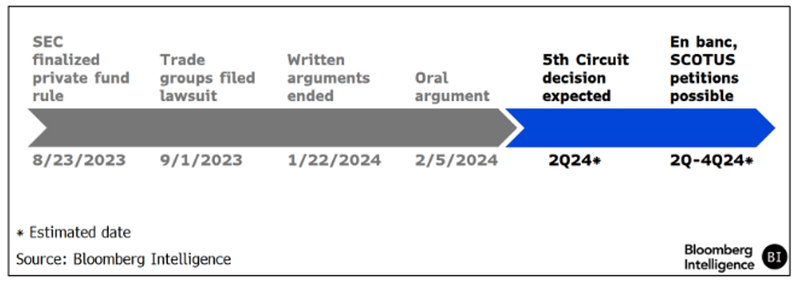Bloomberg Intelligence
This analysis is by Bloomberg Intelligence Senior Industry Analyst Matthew Schettenhelm. It appeared first on the Bloomberg Terminal.
A major change in federal law is poised to hobble US administrative agencies, creating opportunities for businesses and industries that will operate in a transformed regulatory landscape. The Chevron doctrine, which for decades has empowered regulators to shape federal laws with only minimal court oversight, has been curtailed, as we expected. We expect courts to continue to confine federal regulators’ power to interpret the law, affecting companies across a range of sectors.
Key Dates in the Litigation

Key Research Topics
- Financials: Lawsuits filed immediately after finalization of the Consumer Financial Protection Bureau’s late-fee limit for credit cards and the Securities and Exchange Commission’s private-funds rule underscore a recurring theme: President Joe Biden’s financial regulatory agenda will likely continue to meet setbacks as courts negate his moves. This is expected to ease pressure on banks like JPMorgan and Bank of America, lenders, brokers, servicers, crypto companies like Coinbase, credit bureaus and other financial-services entities.
- Telecom, Media & Technology: The Federal Communications Commission’s effort to restore federal broadband regulation over AT&T, Charter, Comcast and others faces a perilous future without deference, and the Federal Trade Commission’s attempt to regulate “surveillance advertising” by online platforms like Alphabet and Meta will struggle to survive in court.
- Health Care: Health and safety programs administered by the Centers for Medicare & Medicaid Services and the Food and Drug administration could draw more scrutiny, complicating the setting of payment rates for hospital systems such as HCA Healthcare, coverage decisions product-safety review and regulatory guidance for companies like Genentech and AstraZeneca..
- Industrials: The Environmental Protection Agency’s recent moves to regulate per- and polyfluorinated substances, or “forever chemicals” that were made by companies including DuPont and 3M, under the Safe Drinking Water Act and the Comprehensive Environmental Response, Compensation and Liability Act will likely be subject to litigation challenges, and we expect deference issues to weigh heavily on how those efforts are crafted — and possibly even shift outcomes.
- Cross-Sector: The FTC’s novel rule banning many non-compete agreements across the US rests on a shaky legal foundation, and we doubt it can survive without traditional deference to agencies. Likewise, the SEC’s climate-related disclosure rule faces multiple legal vulnerabilities, including concerns under the “major questions” doctrine.
Are you a terminal user? Click here to access the full report.
Not a terminal user? Click here to learn more.
This is a synopsis of the full report. This is not an investment recommendation. All investors are advised to conduct their own independent research and consult a licensed investment professional before making a purchase decision. In addition, investors are advised that past investment performance is no guarantee of future price appreciation or performance.